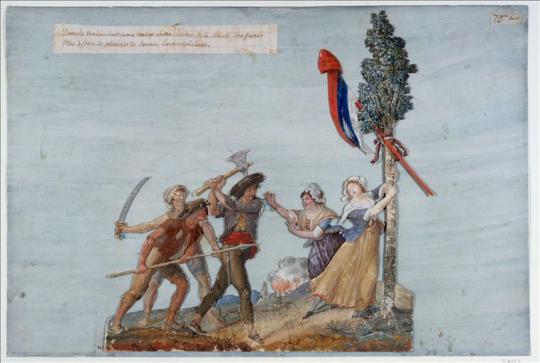Part 7. La Citoyenne du Monde: women in the provinces, women from abroad
More often than not, the events of and political activism within the French Revolution are focussed on Paris. While France had been in process of centralisation since the emergence of absolutism, and the French Revolution somewhat furthered this process, the revolution was by no means Paris-based only. The french provinces, far from remaining passive or, as during the civil war, rejecting towards the revolution, played their unique role within the events, and faced theor own obstacles (for instance the royalist and girondin gathering in some provinces).
Likewise, the French Revolution became a European event even before the wars: intellectuals of all countries discussed the events, political decisions and ideas coming from France, and a good number of intellectuals travelled to France and took an active part in the turmoil themselves.
Women were among them all the time. This part presents some of them, both in the french provinces and coming to France from abroad.
Province
Thérèse Caval, (~1750-11.5.1795), Marseille revolutionary, seen as the driving force behind the hanging of a counter-revolutionary woman, murdered during a royalist massacre. See her Wikipedia entry here.
Élisabeth Taneron, dite la « Fassy », (d. 11.5.1795), Marseille revolutionary, murdered in prison by royalist forces with her three months old infant, friend of La Caval.
Lenormand, from Cany, member of a republican women’s club in 1794 (after the prohibition of political women’s clubs). Speech: “Nous savons qu’il y a des héroïnes qui ont eu l’honneur de combattre dans les armées avec nos braves sans-culottes ; imitons leur courage, faisons ce qui dépend de nous pour être utile à la Patrie.” (”We know that there are heroines who had the honor of fighting in the armies with our brave sans-culottes; let’s imitate their courage, let’s do what depends on us to defend the patrie.”)
Mme Yger, from Cany, member of a republican women’s club in 1794 (after the prohibition of political women’s clubs). Speech: “Nous sommes faites pour la liberté, elle nous est naturelle. […] Nous saurons manier avec autant de souplesse la massue d’Hercule que pousser l’aiguille, et conduire nos fuseaux.” (”We [women] are made for liberty, it is natural to us. […] we know how to wield Hercules’ club as skillfully as we know how to wield our needle and our spindle.”)
Leborgne, from Cany, member and president of a republican women’s club in 1794 (after the prohibition of political women’s clubs), made a public speech.
Lalouette, from Cany, member of a republican women’s club in 1794 (after the prohibition of political women’s clubs), made a public speech.
Madame Thiefaine, Valogne (Manche): “[about the 1793 Constitution which she generally approves] But there remains to overcome injustices toward my sex that they [the representatives in the Convention] seem deter for all time from all public administration and forbid it even to express its sentiments on the great interests of the patrie.” (She was by far not the only woman to voice this criticism and demand political and voting rights for women; so did the women’s clubs in Beaumont (Dordogne), Nancy, Le Mans and Besançon.)
Blandin Demoulin, president of the women’s club in Dijon in 1793,
Foreigners
Anne-Josèphe Thèroigne (1762-1817) was a socialite, singer, orator and organizer in the French Revolution. Here is her Wikipedia entry, and here her portrait.
Etta Lubina Johanna Palm d'Aelders (April 1743 – 28 March 1799) was a Dutch feminist outspoken during the French Revolution. She gave the address Discourse on the Injustice of the Laws in Favour of Men, at the Expense of Women to the French National Convention on 30 December 1790. Here is her Wikipedia entry.
Caroline Albertina Michaelis-Schelling, (1763-1809) she was a German intellectual who, as a widow and single mother, moved to revolutionary Mainz, which was under French occupation at that time, where she joined political clubs. After the defeat of the revolutionary forces, she was imprisoned for her political beliefs. She ultimately moved to liberal Jena, where she worked as an author and translator, remaining true to her democratic ideas. Here is her Wikipedia entry.
Helen Maria Williams, (1759-1827) an english author passinate about the French Revolution, sided with the Girondists and was briefly emprisoned durin terreur, but remained a resident in France for most of her life. Her Wikipedia entry is here.
Mary Wollstonecraft, (1757-1797), author, feminist. She went to revolutionary France as a journalist. She sided with the girondists and welcomed the downfall of the Robespierrists. Here is her Wikipedia entry.

Keine Kommentare:
Kommentar veröffentlichen